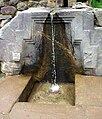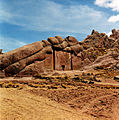Ancient Atronauts ❌ -> Ancient Concrete ✅ + Ancient plant acids✅
Kein Geopolymer aber mit Pflanzenextrakten verflüssigte Steine: Erklärung der Methode: https://www.youtube.com/watch?v=m_H5JQNI8A4 (ab Minute 8:00)
-
„Baño de la Ñusta“ in Ollantaytambo
-
„Mondtempel“ nahe Machu Picchu ebenso in einer Höhle gelegene Tore, die ins Nichts führen
-
Höhle in Machu Picchu, die ebenso Tore beherbergt, die ins Nichts führen und die ebenso ein umgekehrtes „V“ bildet wie die Höhle von Naupa Iglesia und vor der sich ebenso ein Stufenmotiv befindet
-
Stufenmotiv nahe Höhleneingang bei Sacsayhuamán
-
Sitzartige Ausarbeitungen in Sacsayhuamán, die denen von Naupa Iglesia ähneln
-
Aramu Muru: De facto mit Pflanzenextrakten verflüssigt dann geformt
-
Das Khazne al-Firaun
-
De facto mit Steinauflösungsflanze geformt; Bausteine wurden dann wie Butter aus dem Felsen geschnitten; Smoking Gun ein unfertiger Baustein steckt noch im Felsen
Salomonischer Tempel -> Planzenextrakte -> Shamir [1]
Very old legends from Peru, collected by the priest Jorge Lira (e.g. Blázquez, 2003) tell that gods once gave people two gifts of valuable herbs. One was “a plant, which, mixed with other components converted the hardest rocks into a soft and formable mass”. This gift was apparently communicated via an Andean woodpecker, Colaptes rupicola, locally called Pito, a bird of the size of a pigeon, that uses to drill a nest hole into quite rocky facades.
God specifies that no iron shall be used to build the Holy Temple in Jerusalem, since iron is a tool of war. King Solomon wonders how builders will be able to cut the massive pieces of wood and stones. [...] Solomon summons the birds with his ring. The albatross says there is a bird in the northern sea that uses a tool to make its nest in rock.
Geopolymer-Zement
De facto-Geopolymer-Zement- und mögliche geopolymere Stätten:
Bolivien
BearbeitenLibanon
BearbeitenSyrien
BearbeitenItalien
BearbeitenÄgypten
BearbeitenSchwierigkeit: Sowohl behauene Steine als auch Geopolymer-Zement wurde verwendet
Osterinsel
BearbeitenKrim
BearbeitenMalta?
Bearbeiten-
Schleifspuren an der Westküste von Gozo, ins Meer führend
-
Schleifspuren an der Westküste von Gozo
-
Schleifspuren auf dem Ta' Ċenċ Plateau (Gozo): Eine Gabelung
-
Schleifspuren auf dem Ta' Ċenċ Plateau (Gozo)










